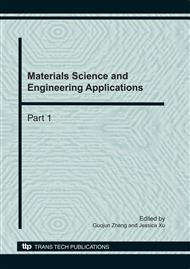p.1245
p.1253
p.1257
p.1264
p.1270
p.1276
p.1280
p.1285
p.1291
The Stabilization of Central Wavelength of Fiber Bragg Gratings by Thermal Contraction Effect of Kovar Substrate
Abstract:
A stabilized laser is essential for optical fiber communication network. One of the passive technique for stabilization of central wavelength of laser is based on the application of fiber Bragg gratings. Due to the positive coefficient of thermal expansion of optical fiber, the Bragg gratings within the fiber written by excimer laser gives about 0.01nm/oC shift on the central wavelength respect to the ambient temperature which leads serious problem in the communication network. Since both the temperature and tension force are linearly proportional to the central wavelength of fiber Bragg gratings. A feasible approach to derive the wavelength stabilization is to decrease the tension force of fiber Bragg gratings respect to the increase of ambient temperature. In this paper, a Kovar substrate with negative coefficient of thermal expansion is used to decrease the tension force while the environmental temperature increases. The experimental results show that the coefficient of thermal expansion of the Kovar substrate is negative and linearly proportional to the temperature. Thus, this Kovar substrate differing from the constant negative coefficient of thermal expansion ceramic substrate induces about 0.0085nm/C on the fiber Bragg gratings, which shows the well application of this Kovar for athermalization of the fiber Bragg gratings in optical communication system.
Info:
Periodical:
Pages:
1270-1275
Citation:
Online since:
November 2010
Authors:
Price:
Сopyright:
© 2011 Trans Tech Publications Ltd. All Rights Reserved
Share:
Citation:


